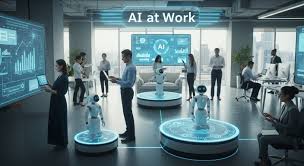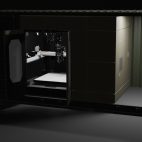The past few years have witnessed more rapid changes in the workplace than decades before. Artificial Intelligence (AI) technology is a major driver of this transformation, enhancing productivity, automating tasks, and enabling employees to work from anywhere. The traditional fixed office is becoming less attractive as companies seek smarter, flexible solutions that align with the digital age of work.
Many organizations are rethinking their office strategies. Downsizing to part-time or shared office spaces allows businesses to meet their actual needs while saving costs. This approach is versatile, cost-effective, and provides the comfort and scalability modern teams require, allowing organizations to adjust quickly as operations fluctuate.
The AI Revolution and Its Impact on Traditional Workplaces
AI technology has transformed many routine processes, from data analysis to customer service. Tasks that previously required large teams can now be handled efficiently by AI systems or remote workers. This shift reduces the need for employees to be physically present in the office daily, reshaping the role of office space in modern organizations.
Cloud-based applications, AI chatbots, and virtual assistants enable seamless collaboration across distances. Online meetings replace the need for physical conference rooms, and AI-driven workflow systems assist with scheduling and task management. As these technologies mature, the necessity for traditional office setups continues to decline.
Why Businesses Are Moving Toward Flexible Office Spaces
The rise of AI has opened new possibilities for workplace flexibility. Many companies no longer require full-time offices. Flexible offices, coworking spaces, and part-time arrangements are increasingly preferred.
Flexible offices allow businesses to pay only for the space they use, whether on an hourly, daily, or weekly basis. This significantly lowers overhead costs while providing professional environments without long-term commitments. Companies can access fully equipped spaces without being locked into costly leases.
Advantages of Choosing Flexible Office Solutions
Here are key reasons companies are favoring flexible offices in the AI-driven era:
- Reduced expenditures and less binding contracts
- Access to modern technology and professional facilities
- Support for distributed or hybrid teams
- Scalability for short-term adjustments in office usage
- Improved employee work-life balance
These benefits illustrate how flexible offices complement AI technology, allowing companies to focus on growth rather than office management.
Exploring Different Types of Flexible Office Spaces
Coworking Spaces for Collaboration
Coworking offices house multiple businesses and freelancers, fostering innovation, networking, and knowledge-sharing. They include essential facilities such as high-speed internet, meeting rooms, and refreshments, making them ideal for startups and remote professionals who value connectivity and flexibility.
Executive Suites for Professional Growth
Executive suites are luxurious, professional spaces designed for small firms that need a credible office presence without high costs. These suites typically include reception services, furnished offices, and conference rooms, providing an impressive business environment while maintaining flexibility.
Part-Time Offices for Smart Budgeting
Part-time offices allow businesses to rent workspace only on certain days or hours, ideal for professionals who do not require a full-time office. These offices come equipped with essential facilities such as internet and meeting rooms, offering a cost-effective solution.
Virtual Offices for Remote Efficiency
Virtual offices provide a business address and communication services without physical space. They help businesses maintain credibility and manage correspondence effectively, especially for AI-driven companies that operate primarily online.
How AI Complements the Flexible Workspace Model
AI enhances the functionality of flexible offices. Smart office systems can control lighting, heating, and security. AI chatbots manage bookings and customer inquiries, while analytics tools track workspace usage and suggest optimization measures. These AI-powered features make flexible offices more productive and user-friendly, enabling employees to focus on high-value work.
Cost Efficiency in the AI-Driven Business World
Flexible office solutions are highly cost-effective. With AI automating tasks, businesses need fewer in-office staff and less space. Savings on utilities, furniture, and maintenance allow organizations to invest in technology, innovation, and employee development. Scalable, part-time, or shared office plans make professional environments accessible to companies of all sizes.
The Role of Flexibility in Employee Satisfaction
AI and flexible office models enhance employee satisfaction by supporting hybrid and remote work. Employees can work from home on certain days and come to the office as needed. Flexible spaces also reduce commute stress, promote better mental health, and encourage collaboration. AI tools handle repetitive tasks, giving employees more time for creative and strategic work.
How Businesses Can Transition to a Flexible Office Model
Companies planning to transition to flexible office spaces should start by analyzing work patterns and space requirements. AI-driven analytics tools can monitor employee behavior and workspace usage, helping businesses determine the right mix of coworking spaces, executive suites, and part-time offices. Solutions like Regency Executive Offices offer customizable options for different company sizes and industries.
The Future of Work in the Age of AI
The future workplace will blend AI technology with adaptable office environments. Physical offices will serve primarily as collaboration hubs rather than mandatory workspaces. AI systems will continue to coordinate employees and optimize spaces, making flexible offices smarter and more efficient. Early adopters of these solutions will gain a competitive edge.
Conclusion
AI technology has redefined the modern workplace, transforming how businesses operate, communicate, and collaborate. Traditional offices are no longer essential, thanks to automation, remote working tools, and flexible office solutions. Coworking spaces, executive suites, and part-time offices offer professional settings with the flexibility that contemporary companies require.
For growing businesses embracing AI, flexible office spaces are not just an option—they are the future. They reduce costs, enhance productivity, and support a dynamic, employee-friendly work environment.





